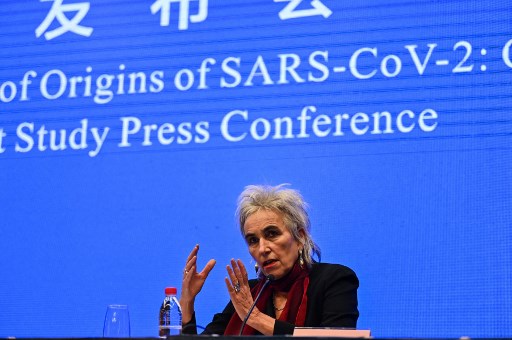WUHAN, Feb 10 — A much-anticipated inquiry into the origins of the coronavirus pandemic wrapped up its mission in China on Tuesday with no breakthrough discovery, as investigators ruled out a theory that Covid-19 came from a lab while failing to identify which animal may have passed it to humans.
It remains unclear which species first transmitted Covid-19 to humans, said Liang Wannian, who headed up the Chinese contingent of an inquiry carried out jointly with World Health Organisation (WHO) experts.
The WHO mission — which China repeatedly delayed — was dogged by fears of a whitewash, with the US demanding a “robust” probe into the origins of the pandemic in late 2019, and China firing back with a warning not to “politicise” the investigation.
During the closely monitored mission, which included a visit to an exhibition celebrating China’s recovery, reporters were largely kept at arm’s length from the experts.
Liang, supported by WHO expert Ben Embarek, said there was “no indication” the sickness was circulating in Wuhan before December 2019 when the first official cases were recorded.
Embarek, who said identifying the virus’s pathway from animals to humans remains a “work in progress”, also scotched a controversial theory that the virus had leaked from a lab, calling it “extremely unlikely”.
As investigators have struggled to pinpoint the origins of a virus that has now killed more than 2.3 million people, governments continue to grapple with its daily consequences.
Vaccination campaigns are gaining pace worldwide, with Iran the latest country to begin a rollout of Russia’s Sputnik V jab.
Iran’s President Hassan Rouhani dedicated the drive to the “memory of the martyrdom of health workers”, as medics at Tehran’s Imam Khomeini hospital received the first shots.
Iran is also expected to receive 4.2 million doses of the AstraZeneca-Oxford vaccine under the Covax scheme, which intends to ensure jabs are distributed across the world and not hoarded by richer nations.
The AstraZeneca vaccine makes up the bulk of initial Covax deliveries to some 145 countries, but it suffered a setback with a recent trial showing it offers only minimal protection against the coronavirus variant first detected in South Africa.
The results forced South Africa to delay the start of its vaccinations, but the WHO has insisted that the AstraZeneca shot remains vital to the global fight against Covid-19.
AstraZeneca has said researchers are working on an updated version that can be effective against the new variants. WHO authorisation for the shot is expected next week.
Despite the vaccine rollouts — more than 136.5 million people have received jabs around the world so far, according to an AFP count — life is far from back to normal for most people.
The pandemic and associated restrictions have crushed entire sectors of the global economy, laid waste to sports and cultural calendars and confined hundreds of millions to their homes.
Greece will see tightened curbs from Thursday, especially in the Athens region, where schools will be shut as well as shops apart from those selling necessary goods, Prime Minister Kyriakos Mitsotakis said.
An extension of Germany’s strict curbs is also in the offing as Chancellor Angela Merkel warned against a “premature” end to a partial lockdown.
Germans are clearly growing weary of the restrictions, with a YouGov poll this week showing that just half of respondents wanted current measures to be maintained or tightened.
That was down from nearly 65 percent in early January, when daily deaths stood at roughly 1,000 — a figure that has since halved.
In the Netherlands, hopes for a revival of a legendary ice race have been raised by an ever-thickening ice layer on the country’s famous canals thanks to persistent freezing temperatures.
But Prime Minister Mark Rutte has ruled out the staging of the first Elfstendentocht (Eleven Cities Race) since 1997, saying skating must be limited to pairs under anti-Covid restrictions.
Spain passed the three-million-case mark on Tuesday, after health officials blamed an easing of restrictions over the Christmas holidays for a surge in infections early this year.
As the pain of shutdowns has bitten hard, governments have turned to other measures to try to facilitate reopening — mass testing campaigns and quarantines for travellers are still prominent tools.
Britain is the latest country to order international travellers to undergo several tests while under quarantine.
But the surest sign that the world is far from back to normal comes from Tokyo, where organisers of this summer’s Olympic Games have issued a 33-page booklet of rules on social distancing.
Athletes’ time in Japan will be minimised to reduce the risk of infection and those staying at the Olympic Village will be expected to “avoid unnecessary forms of physical contact”.
Despite this, organisers told AFP on Tuesday that they still plan to hand out roughly 150,000 free condoms to athletes.
© Agence France-Presse








